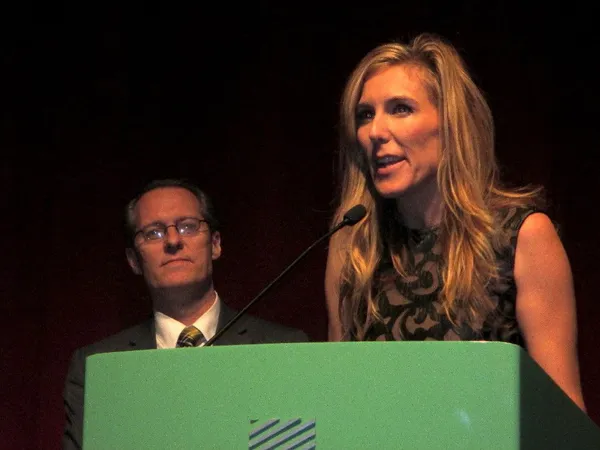 |
| An Open Secret director Amy Berg with DOC NYC Artistic Director Thom Powers at the world premiere Photo: Anne-Katrin Titze |
After the DOC NYC press screening of Amy Berg's latest film An Open Secret was cancelled on November 4, it looked as if the world premiere would not see the light of day. On a chilly fall night in New York City at the SVA Theatre in Chelsea, not only was the film screened on schedule 10 days later as a Special Event but Amy Berg, along with Evan Henzi, one of the film’s subjects and his mother Anita Henzi, BizParentz founders Anne Henry and Paula Dorn, Joey Coleman and journalist John Connolly came for a Q&A after the movie.
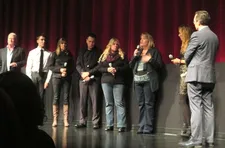 |
| An Open Secret world premiere John Connolly, Evan H., Anita H., Joey C., Paula Dorn, Anne Henry, Amy Berg and Thom Powers Photo: Anne-Katrin Titze |
The filmmaker known for West Of Memphis and Deliver Us From Evil, is also the director of Every Secret Thing, her fiction feature debut which stars Diane Lane, Elizabeth Banks, Dakota Fanning and Nate Parker. It was screened at this year's Tribeca Film Festival.
DOC NYC Artistic Director Thom Powers introduced the evening.
Thom Powers: You are the first audience to see this film. As you may have read, we had a press screening that didn’t happen. I’ve probably talked more about this film and have been asked more questions about this film than any of the other 150 films and events that we have in the festival. It feels very momentous to be standing on the stage and finally sharing this with you now. This film gets at something that there has been a wall of silence around for a long time. This film feels like it is a sledgehammer that is taking a bash into that wall. I think once that blow has been struck you’re going to see that wall open more and more.
I feel incredibly moved by the brave people who tell their stories in this film and I feel incredibly honored to be hosting the brave director Amy Berg. I’ve known Amy’s films for at least nine years when I first presented her film Deliver Us from Evil. I’ve shown her film West of Memphis. If you know those films, you understand the incredible commitment Amy has, her careful approach to very difficult topics. That’s exactly the kind of skill and care and craft that she brings to An Open Secret.
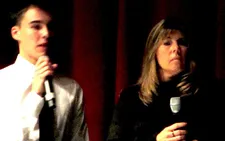 |
| Evan H. with his mother Anita H.: "I didn’t think anybody would ever make a film like this…" Photo: Anne-Katrin Titze |
After the screening Powers and Amy Berg were joined by Evan Henzi, Anita Henzi, Anne Henry, Paula Dorn, Joey Coleman and John Connolly.
Amy Berg: This couldn’t have been possible without everyone on this stage… It was so emotionally exhausting at times. There were so many walls that went up as we were making the film.
Thom Powers: Paula and Anne, can you talk about the work that you are doing now and what that film means to that work?
Anne Henry: We started this journey long before we met Amy not really knowing what to do with it. You can really feel that from the parents of the kids that talked in the film. You could tell that they just don’t know what to do with it. It’s heartbreaking. Over the years as we started to gather stories and connections and people and started to understand what a predator does, we realised that the most important thing was to be able to tell the parents who are in Hollywood now, how this works. So that maybe if they could just see it, maybe they’d recognise it, if they had some little hint that this even happened in the world at all.
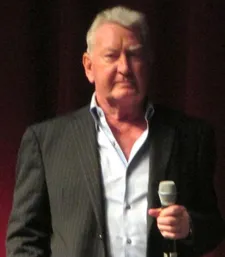 |
| Journalist John Connolly: "The reason why this film is having a hard time getting distribution is because of Hollywood." Photo: Anne-Katrin Titze |
We are so happy with how this film was done. It was sensitive in the right way and not sensationalised. We were thrilled to give our files to them, knowing that they would be able to do so much more than we could ever do with a non-profit. While they were working on the film, we worked on some legislation in California. We got a law passed for the first time, amazingly, that people working in the industry with children now have to be fingerprinted, but only in California. That happened during the film. It happened partly because of the film and partly because of the victims, especially Evan, who was very instrumental in that legislation.
Amy Berg: During the interviews with Michael Harrah [talent agent and co-founder of SAG-AFTRA's Young Performers Committee] he mentioned your bill. He said, ‘oh, yeah, I think there is a fingerprinting bill. I haven’t really gotten around to doing it yet, but I know I got to do that.” I just wonder how the policing of that will ever come into play. Obviously, it’s such a huge first step.
Paula Dorn: We’re very much struggling with the policing of that. There’s no entity that actually goes out and does that. We try to educate the parents not to work with them if they haven’t abided to those laws. The educational need is huge. The turnover in Hollywood of parents and kids is huge and there is a constant need to educate.
Powers: Evan and Anita, you have done a lot of speaking out about this in court and continue to. What does it mean to you to participate in this film?
Evan H.: I didn’t think anybody would ever make a film like this… I hope this film doesn’t just get buried with the rest and that this becomes an increasingly talked about subject.
![Director Amy Berg: "When I read John’s [Connolly] article from 2002, that got killed, that story just killed me."](/images/newsite/Director Amy Berg(1)_225.webp) |
| Director Amy Berg: "When I read John’s [Connolly] article from 2002, that got killed, that story just killed me." Photo: Anne-Katrin Titze |
Amy Berg: I think it’s really important that we point out that there’s been a lot of headlines about Mike Egan, obviously. He filed lawsuits about a year and a half after we interviewed him the first time. We were all kind of hit by a storm when that happened. Mike participated in this film because he wanted to get help for his friend. He had so much guilt that he brought his friend to that party. That was his first experience with that group socially. He got drugged and look where he is now.
Mike definitely encountered an attorney that he probably shouldn't have encountered and there's been so much negative publicity…we don't know about the case, this isn't about the case… When I read John’s [Connolly] article from 2002, that got killed, that story just killed me. I wanted to meet Mark [R.] so badly and Mike opened that door for me. I do hope that the foundation will funnel money in so that Mark [R.] can get some help.
Powers: Joey, let me turn to you. We see that incredible scene in the film where you are confronting Michael Harrah on the phone and then Amy has this interview with him. Can you talk about your own choice to participate in this film?
Joey C: I can only say that I was concerned as I sat down to watch it. I was worried what I was going to feel at the end of the film. Would I feel positive or negative about how I came across, because, let’s face it, that’s what prevents people from coming forward because they are afraid of being labeled many things - whatever you are thinking about right now in your mind. At the end of the film, after watching it, I felt really good. I thought you [Amy] did a great great great job. About Michael Harrah – I love how you put together my scene and then his scene. It was really fascinating to see how quickly we forget.
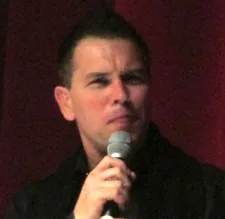 |
| Joey C.: "I was worried what I was going to feel at the end of the film." Photo: Anne-Katrin Titze |
How easy it is to brush something off. ‘Oh, I think that it’s normal and it might have happened to me and well, you know it’s just one of those things, those crazy things, la-di-da’ and yet, right there on record, on tape its”remember that time you were inappropriate with me?” “Yeah, I shouldn’t have done that.” There is no real grey area except, you know, that happens, it’s rampant, it happens all the time. I’m shocked with all the stories. Seeing it, I hope, like Evan said, I hope that it becomes a prevention for the future because we can’t change what happened. We can only make it a more regulated industry.
Powers: John Connolly, you’ve written as a journalist about this story for a long time and you faced opposition, having your story killed. I wonder what is your perspective on some of the roadblocks in getting this story out into the world?
John Connolly: Power and money is always going to win. Let’s get that clear. The reason why this film is having a hard time getting distribution is because of Hollywood. They don’t want the story to come out. They didn’t want my story to come out twelve years ago. And it’s a tragedy but that’s how life is, sadly. Maybe this can change. Amy has done a wonderful job.
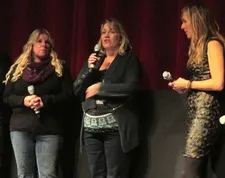 |
| BizParentz founders Paula Dorn and Anne Henry with Amy Berg: "We are so happy with how this film was done." Photo: Anne-Katrin Titze |
Powers: How would you compare the role of power in the Catholic Church to the role of power in Hollywood? Are there similar dynamics? Is there a similar potential for the same shift that took place in the Catholic Church to take place in Hollywood?
Amy Berg: It took a long time with the Catholic Church. I think it’s a very similar power dynamic, maybe even greater in Hollywood because everyone wants to be famous. Everybody wants to get that part and there is something very glamorous and powerful and there are just so many of the same themes that exist in Hollywood. 12 years ago, the article got killed. Here we are 12 years later. We get one screening, maybe we'll get distribution. It's not very likely, but we really do hope that someone will put this out. Hopefully this screening will lead to something great like that. But I just think it's a step forward, people will talk about it and it will be progressive.





















